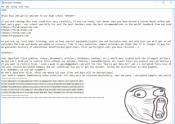Category: Removal Guides
How to remove loadstart.net page
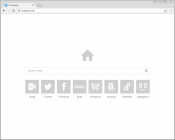
Loadstart.net is a nasty domain belonging to the malware that is known as browser hijacker. If your system is infected with the threat, you will soon be aware of it. Since, as the name of the hazard implies, it affects browser setting. The first thing that you will spot is the change of the homepage - your browser will open loadstart.net with the launch and use it as the main search engine.
How to remove control.kochava.com page

control.kochava.com is a page with unclear but still disturbuting purposes. Many users, who had whis malware, didn’t notice it for a very long time. Others, who had anti-malware programs running, claimed that the applications detected and blocked control.kochava.com. Though, the presence of this malware almost doesn’t give itself away, you may observe computer’s strange behavior.
How to remove AppTrailers ads

The application with the name of AppTrailers looks very timely, as it presents reviews and announces of the newest and most trending applications. The user is lured into watching these short videos by different offers of bonus point for each view. However, it’s better not to swallow this bait, as AppTrailes program will fill your browsing with commercials and redirections.
How to remove Unblockupc ransomware and decrypt the files
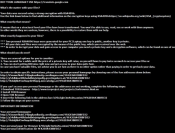
In the forefront of ransomware development, yet another hazard has appeared. Its name is UnblockUPC and it successfully utilizes the techniques that its predecessors use. It stealthily enters the systems and start encryption, after which the ransomware displays a notification with demands for decryption. The instructions for obtaining the decryption key are contained within Unblock your files.html, which states that the victim is punished for visiting illegal sites.
How to remove gad.ridiculesdamningly.com pop-ups

The case when you suddenly notice the huge increase of ads amount within the browser may speak for gad.ridiculesdamningly.com presence on your system. Gad.ridiculesdamningly.com is a service that is responsible for adding commercials to victims’ browsers. It may be difficult to detect and identify, as the ads that appear because of it may have different origins.
How to remove yourconnectivity.net page
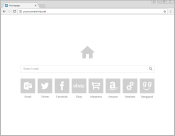
If you see the yourconnectivity.net page in your web browser, as it opens, and can’t donything to change it, then we have bad news for you. This domain proved to belong to a browser hijacker threat of the same name. And even if you think that you can work with this page, as it looks like a reliable search page with a clean design, we would assure you that you need to remove yourconnectivity.net as soon as possible. It is true that some of the hijacker’s victims at first like this search engine, since it looks neat with nothing of extent but a logo, a search bar, and some quick-access icons linked with popular services.
How to remove n1n1n1 ransomware and decrypt the files

The infection of n1n1n1 ransomware may be considered as a prank or a scareware, as it doesn’t look very hazardous. A meager ransom message and a plainly-designed website don’t give an impression of a serious threat. However, the actions of ransomware leave no doubt that this infection will bring many troubles and place in jeopardy all data kept on the computer.
How to remove fullsearching.com page
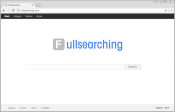
While there are many search domains with a high standing, new search pages continue to appear. And not all of them are safe and worth using. Fullsearching.com is one of them - this page belongs to a browser hijacker group and is considered to be hazardous to the system. Though it is not a virus, but a malware, it still can injure your PC in an indirect way.
How to remove Critical System Failure alert

Critical System Failure pop-up is a scam that imitates a Windows alert that attempts to persuade you to believe that your system has irreversible problems. The message doesn’t say though what kind of error did occur and as the only method of problem solving offers a phone number of technical support. The message appears on top of all applications and windows, and can’t be close without entering a response code.
How to remove loadstart.net page

Loadstart.net is a nasty domain belonging to the malware that is known as browser hijacker. If your system is infected with the threat, you will soon be aware of it. Since, as the name of the hazard implies, it affects browser setting. The first thing that you will spot is the change of the homepage - your browser will open loadstart.net with the launch and use it as the main search engine.
How to remove control.kochava.com page

control.kochava.com is a page with unclear but still disturbuting purposes. Many users, who had whis malware, didn’t notice it for a very long time. Others, who had anti-malware programs running, claimed that the applications detected and blocked control.kochava.com. Though, the presence of this malware almost doesn’t give itself away, you may observe computer’s strange behavior.
How to remove AppTrailers ads

The application with the name of AppTrailers looks very timely, as it presents reviews and announces of the newest and most trending applications. The user is lured into watching these short videos by different offers of bonus point for each view. However, it’s better not to swallow this bait, as AppTrailes program will fill your browsing with commercials and redirections.
How to remove Unblockupc ransomware and decrypt the files

In the forefront of ransomware development, yet another hazard has appeared. Its name is UnblockUPC and it successfully utilizes the techniques that its predecessors use. It stealthily enters the systems and start encryption, after which the ransomware displays a notification with demands for decryption. The instructions for obtaining the decryption key are contained within Unblock your files.html, which states that the victim is punished for visiting illegal sites.
How to remove gad.ridiculesdamningly.com pop-ups

The case when you suddenly notice the huge increase of ads amount within the browser may speak for gad.ridiculesdamningly.com presence on your system. Gad.ridiculesdamningly.com is a service that is responsible for adding commercials to victims’ browsers. It may be difficult to detect and identify, as the ads that appear because of it may have different origins.
How to remove yourconnectivity.net page

If you see the yourconnectivity.net page in your web browser, as it opens, and can’t donything to change it, then we have bad news for you. This domain proved to belong to a browser hijacker threat of the same name. And even if you think that you can work with this page, as it looks like a reliable search page with a clean design, we would assure you that you need to remove yourconnectivity.net as soon as possible. It is true that some of the hijacker’s victims at first like this search engine, since it looks neat with nothing of extent but a logo, a search bar, and some quick-access icons linked with popular services.
How to remove n1n1n1 ransomware and decrypt the files

The infection of n1n1n1 ransomware may be considered as a prank or a scareware, as it doesn’t look very hazardous. A meager ransom message and a plainly-designed website don’t give an impression of a serious threat. However, the actions of ransomware leave no doubt that this infection will bring many troubles and place in jeopardy all data kept on the computer.
How to remove fullsearching.com page

While there are many search domains with a high standing, new search pages continue to appear. And not all of them are safe and worth using. Fullsearching.com is one of them - this page belongs to a browser hijacker group and is considered to be hazardous to the system. Though it is not a virus, but a malware, it still can injure your PC in an indirect way.
How to remove Critical System Failure alert

Critical System Failure pop-up is a scam that imitates a Windows alert that attempts to persuade you to believe that your system has irreversible problems. The message doesn’t say though what kind of error did occur and as the only method of problem solving offers a phone number of technical support. The message appears on top of all applications and windows, and can’t be close without entering a response code.




